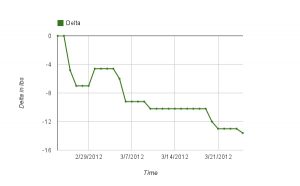The Significance Of Past Weight Loss In Anorexia, Disordered Eating
 Many people assume that eating disorder issues are primarily emotional or psychological.
Many people assume that eating disorder issues are primarily emotional or psychological.
Treatment generally focuses on a patient’s thoughts, emotions, beliefs and personality, and these issues are definitely part of the illness. However, recent research reveals that an individual’s past and present body weights are contributing factors to eating disorders.
“The standards for treating anorexia are all about ‘How much weight do they need to gain to meet a minimally healthy body weight for their height,'” said Dr. Michael Lowe of Drexel University. “What we’ve rarely asked is ‘What is this patient’s weight history?'”
It turns out weight history is highly significant because the body seems to maintain a memory of it. Research reveals that when a person had an elevated body weight in the past and is currently at a body weight that is far below their highest past weight, disordered eating patterns many continue.
Past Weight and Anorexia
The most recent study involved anorexia patients. It showed that the intensity of eating disorder symptoms and the amount of improvement while in treatment depended on a few factors: the amount of weight the patient had lost from their previous highest weight (called weight suppression), what they currently weigh, and the interaction between the two.
Patients with the highest weight suppression were found to have more severe anorexia symptoms than those whose low weight was nearer their highest historical or past weight. This suggests that many anorexia patients weighed more than their peers before developing eating disorder symptoms.
“If the patient’s body somehow remembers that past higher weight, then even at the minimally healthy body weight she is still going to be struggling mightily to maintain her weight,” Lowe said. “That perspective is new. It suggests that future treatments might work toward finding a healthier ‘balance point’ between what patients once weighed and what they currently weigh.”
This research suggests that clinicians who utilize BMI (body mass index) and weight as absolute severity measures for eating disorders should also consider a patient’s weight suppression as a relative measure.
Source: Science Daily
 Eating Disorder Self Test. Take the EAT-26 self test to see if you might have eating disorder symptoms that might require professional evaluation. All answers are confidential.
Eating Disorder Self Test. Take the EAT-26 self test to see if you might have eating disorder symptoms that might require professional evaluation. All answers are confidential.